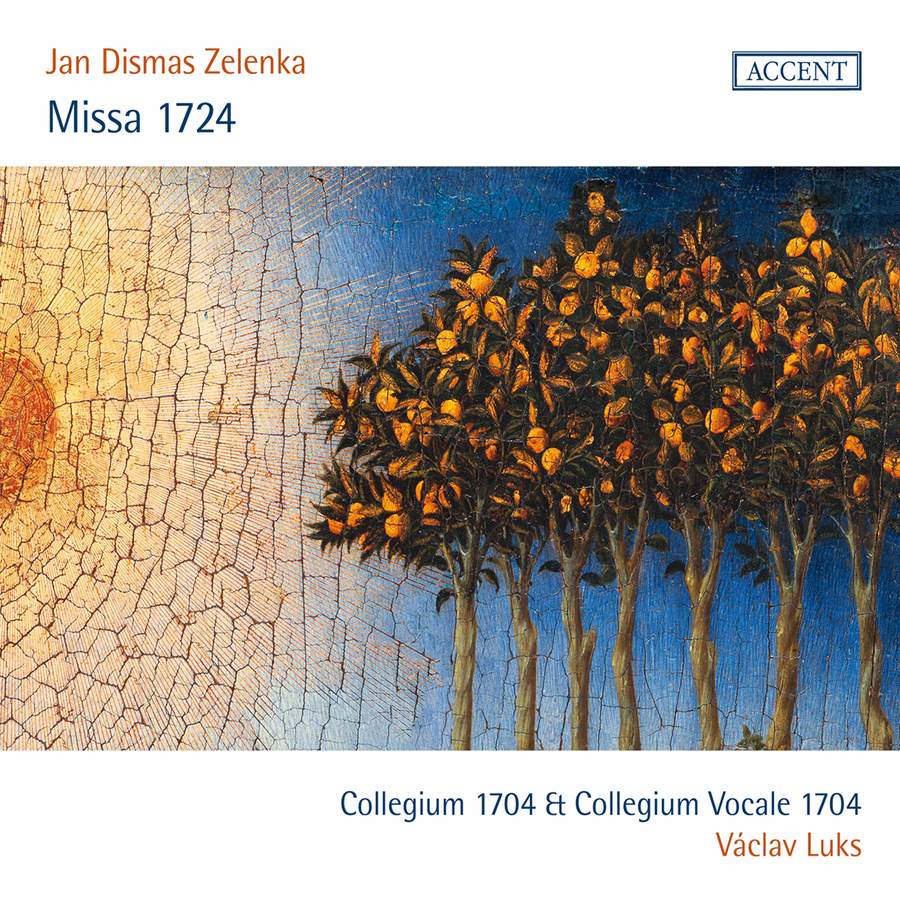ZELENKA Missa 1724 (Luks)
View record and artist detailsRecord and Artist Details
Genre:
Vocal
Label: Accent
Magazine Review Date: 07/2020
Media Format: CD or Download
Media Runtime: 54
Mastering:
DDD
Catalogue Number: ACC24363

Tracks:
| Composition | Artist Credit |
|---|---|
| Kyrie, Sanctus & Agnus Dei |
Jan Dismas Zelenka, Composer
Aldona Bartnik, Soprano Collegium 1704 Collegium Vocale 1704 Kamila Mazalová, Alto Tomás Selc, Bass Václav Čížek, Tenor Václav Luks, Conductor |
| Gloria |
Aneta Petrasová, Alto
Collegium 1704 Collegium Vocale 1704 Jeanne Mendoche, Soprano Kamila Mazalová, Alto Lucía Caihuela, Soprano Tomás Selc, Bass Václav Čížek, Tenor Václav Luks, Conductor |
| Credo |
Jan Dismas Zelenka, Composer
Collegium 1704 Collegium Vocale 1704 Václav Luks, Conductor |
| Salve Regina |
Jan Dismas Zelenka, Composer
Aneta Petrasová, Alto Benjamin Glaubitz, Tenor Collegium 1704 Collegium Vocale 1704 Lucía Caihuela, Soprano Tomás Selc, Bass Václav Luks, Conductor |
Author: David Vickers
This imaginary Mass is constructed from motley liturgical pieces created for various unknown occasions during the first half of the 1720s. Václav Luks’s helpful note explains that some of the material crops up in different forms in Zelenka’s other works. ‘Christe eleison’ is paraphrased from a Miserere (1722), and the second ‘Kyrie’ (repeated for ‘Dona nobis pacem’) is a chromatic double fugue later adjusted in a Requiem for Augustus the Strong (1733). The fabulous music-making does these variants and rarities ample justice. Collegium Vocale 1704’s arching phrases ebb and flow, with eloquent leaning upon Zelenka’s rich harmonic suspensions and a cultivated blend between all strands of textures. The excellent orchestra pay keen attention to sonorities and rhetorical vitality.
Dated 1724, the Gloria is extensively reworked from Zelenka’s own early Missa Judica me (1714), also with prominence given to the new addition of trombones. The springy opening, replete with oboes and vigorous gestures, has impressively balanced interplay between soloists, full choir and the orchestra’s energy and élan. Sudden switches between sentimental slow moments and lively Italianate quick-fire passagework in the aria ‘Laudamus te’ require gentle fluidity and declamatory fervour from the tenor Václav Čížek. The duet ‘Qui tollis’ is sung delicately by the soprano Jeanne Mendoche and alto Aneta Petrasová, accompanied tastefully by two lutes, chamber organ, and three trombones that play with dexterity and gravitas. There is more than a whiff of Lotti in a short yet harmonically astounding ‘Qui sedes’, and the convivial ‘Quoniam’ is sung suavely by the bass Tomáš Šelc.
A concise eight-voice double-choir Credo (c1724) is packed densely with inventive counterpoint and colours, especially its quirky concluding ‘Amen’. It is tricky to predict where Zelenka is aiming to take us during a strange ‘Osanna’ fugue that ends the Sanctus – but a fascinating contrast of function and temperament is provided by the straightforwardness of a compact Benedictus interpolated into Zelenka’s copy of a Mass by Giovanni Pisani (perhaps in the early 1730s). The afterpiece Salve regina is preserved only in a copy made by Bach’s Leipzig successor Gottlob Harrer, and it is a parody of a canzon from Frescobaldi’s Fiori musicali (1635); the knowingly archaic idiom ensures that Luks’s selection of rarities covers multiple facets of Zelenka’s complex musical personality.
Discover the world's largest classical music catalogue with Presto Music.

Gramophone Digital Club
- Digital Edition
- Digital Archive
- Reviews Database
- Full website access
From £8.75 / month
Subscribe
Gramophone Full Club
- Print Edition
- Digital Edition
- Digital Archive
- Reviews Database
- Full website access
From £11.00 / month
Subscribe
If you are a library, university or other organisation that would be interested in an institutional subscription to Gramophone please click here for further information.




